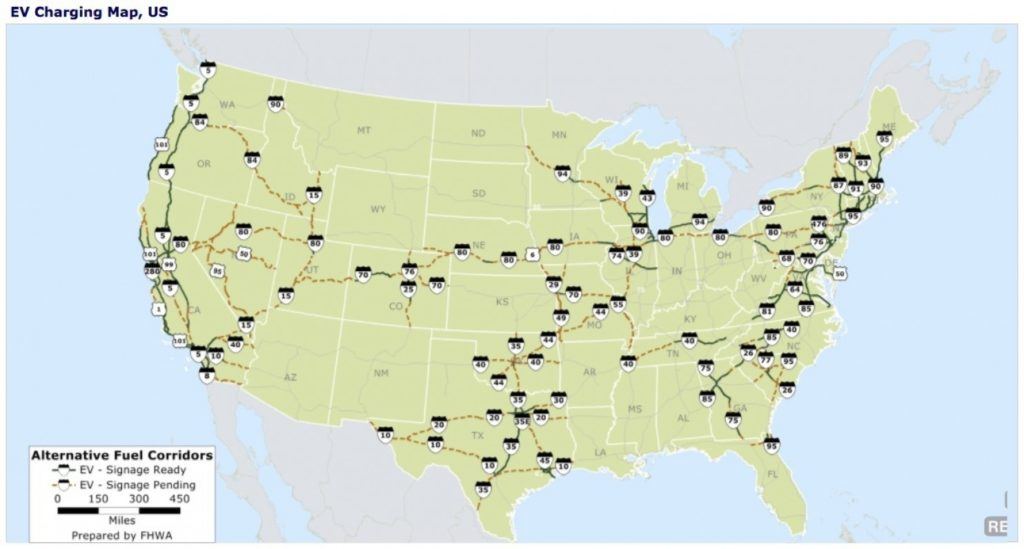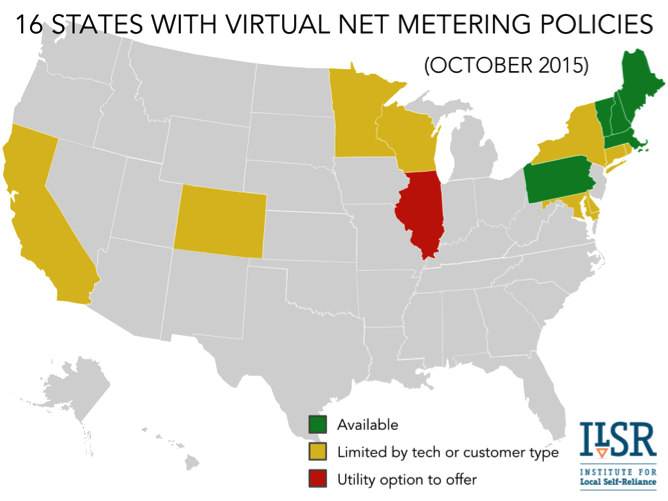This week in Energy Democracy news:
Battles abound over energy policy across the United States, small town renewable energy builds local communities, and new interstate highway electric vehicle infrastructure proposed.
Featured Stories
Being Black still a barrier to rural cooperative board membership by John Farrell, CleanTechnica
Size really doesn’t matter for renewable energy arrays by John Farrell, Smart Energy Universe
Messy battles over energy are on ballot across state by Ari Natter and Mark Chediak, Bloomberg Markets
The stakes are so high because there hasn’t been major federal energy legislation in nearly a decade.
There’s “the realization that we are not going to make progress at the federal level,” said John Farrell, a director at the Institute for Local Self-Reliance, a Washington-based non-profit that advises local governments on community development.
Energy policies on the 2016 ballot by John Farrell, CleanTechnica
Video: A renewable energy revolution in small-town America by James and Deborah Fallows, The Atlantic
Cross-country trips in electric cars are about to get easier by Brian Fung, The Washington Post
The routes will have signs pointing drivers to nearby charging points, just as drivers of traditional cars currently benefit from highway signs notifying them of gas stations ahead. The new signs cover roughly 25,000 miles of roadway and will eventually be posted in 35 states and the District of Columbia, according to the Obama administration.
Here’s a map of the EV charging corridors.

Energy Democracy News Across the States
Arizona
Solar battles playing out on Arizona ballot this election by Will Stone, KJZZ
California
California’s electric-car rebates jump for lower-income buyers and vanish for more high earners by Rob Nikolewski, Los Angeles Times
Starting Tuesday, high-income earners are excluded from getting the rebates and prospective buyers from lower-income households will get more money under the state’s Clean Vehicle Rebate Project.
California’s focus on income will not affect the substantial tax credits the federal government offers clean-car buyers.
California district set to save $250K per year with solar energy by Tara Garcia Mathewson, Education Dive
Colorado
City of Denver commits to adding 200 electric cars by 2020 by Danika Worthington, Denver Post
Florida
Down in the polls, utilities pump another $3.5 million into Amendment 1 campaign by Mary Ellen Klas, Miami Herald
Solar measure in the Sunshine State rankles environmentalists by Daniel C. Vock, Governing Magazine
Solar advocates to sue to keep Amendment 1 ballots from being counted by Mary Ellen Klas, Tampa Bay Times
Q&A: A Florida solar advocate calls out utilities on ballot measure by Jim Pierobon, Southeast Energy News
Florida’s outrageously deceptive solar ballot initiative, explained by David Roberts, Vox
Florida wins the prize for the country’s most egregiously misleading referendum by Henry Grabar, Slate Magazine
Florida votes down controversial solar power amendment by Associated Press, WEAR-TV
Solar groups not sure how to proceed after Amendment 1 fails by Jim Turner, Lakeland Ledger
As rooftop solar costs drop, utility attempts to raise barriers may not work by Mary Ellen Klas, Miami Herald
Illinois
Benefits of rooftop solar power largely exceed net metering costs, analysis finds by Ellyn Fortino, Progress Illinois
In Illinois energy bill drama, demand charge is central and evolving by Kari Lydersen, Midwest Energy News
In Illinois, rural co-ops see energy advantage with broadband by David J. Unger, Midwest Energy News
The digital divide presents both a problem and an opportunity for the rural electric cooperatives that serve much of downstate Illinois. On one hand, the lack of infrastructure makes building a 21st-Century grid all the more challenging. On the other hand, there is a strong push to close that digital divide, and cooperatives find themselves uniquely positioned to play a role.
Maine
Portland becomes first city in Maine to require reporting on large buildings’ energy use by Randy Billings, Portland Press Herald
Massachusetts
Tariff system in works as tensions build over solar subsidies by Matt Murphy, South Coast Today
Michigan
East Lansing solar project promises lower energy bills by Alexander Alusheff, Lansing State Journal
Electricity ratepayers bear heavier burden in Michigan by Larry Ward, Bridge Michigan
Senate passes energy overhaul with 15% renewable mandate by Emily Lawler, MLive
Minnesota
‘Flicker’ disagreement could delay Minnesota community solar by Frank Jossi, Midwest Energy News
Less coal fosters more jobs in clean energy by Eric Pasi, St. Cloud Times
Minnesota Farmers Union hosts solar field day by Elizabeth Bateson, KEYC
Red Lake Band of northern Minn. plans for all-solar electric generation by Neal St. Anthony, Minneapolis Star Tribune
Mississippi
Solar power opportunities by Mississippi Sun Herald
Nevada
Greens, solar advocates appeal Nevada net metering decision by Robert Walton, Utility Dive
New York
New York proposes new rates for distributed energy by Miles Farmer and Mark LeBel
The New York Department of Public Service has proposed to change the way distributed energy resources (like community solar and small wind projects) are rewarded for the benefits that they provide to the electricity system. The Department released a landmark report in its “Value of Distributed Energy Resources” proceeding, recommending a methodology by which these resources can receive credits that align more closely with their true value to the electricity system.
Utah
We still haven’t figured out true value of rooftop solar by Salt Lake Tribune Editorial Board
Utah’s Rocky Mountain Power proposes Nevada-style net metering overhaul by Danielle Ola, PV-Tech
Wisconsin
Dairyland Power Cooperative signs up or 15 solar projects by Joseph Bebon, Solar Industry Magazine
Nationwide Energy Democracy News
Fact-checking opponents of the Clean Power Plan by Richard L. Revesz, Denise A. Grab, and Jack Lienke, The Hill
Messy battles over energy are on ballot across state by Ari Natter and Mark Chediak, Bloomberg Markets
The stakes are so high because there hasn’t been major federal energy legislation in nearly a decade.
There’s “the realization that we are not going to make progress at the federal level,” said John Farrell, a director at the Institute for Local Self-Reliance, a Washington-based non-profit that advises local governments on community development.
Oasis microgrids speed recovery from large-scale electrical events by Microgrid Knowledge
Size really doesn’t matter for renewable energy arrays by John Farrell, Smart Energy Universe
100% renewables increasingly looks possible by Jeff McMahon, Forbes
This group is taking on the biggest obstacle to climate action in the country by Natasha Geiling, ThinkProgress
U.S. Governors see microgrids and energy storage as a path to energy assurance by Elisa Wood, Microgrid Knowledge
Comprehensive study proves solar customers don’t hurt non-solar ones by Frank Andorka, PV-Magazine
To date, at least 16 states have reviewed the question of whether having solar customers in a state burdens non-solar customers with excessive costs of infrastructure upkeep. EARPC’s analysis shows that the argument, often put forth by utilities trying to limit solar’s growth, is false. This analysis comes at a critical juncture for the solar industry, as rate design is currently a hot topic in almost every state.
U.S., 35 state to boost electric vehicle charging network by David Shepardson, Reuters
Energy world rocked by Trump win by Robin Bravender, Energy & Environmental Publishing
EVs could add up to 5GW of capacity to the grid by 2025 by Olivia Chen, GreenTech Media
Where will a President Trump take FERC and federal grid policy? by Jeff St. John, GreenTech Media
Trump’s energy vision holds plenty of promise for renewables by Karl-Erik Stromsta, ReCharge News
In solar proceedings, let the sun shine in by Anne Hoskins, Utility Dive
Why ‘a lot has become the new normal’ in state solar policy debates by Herman K. Trabish, Utility Dive
The 117 policy actions in Q3 were spread across 42 states and a range of debate types. The most common were fixed charge increases, with 44 utilities in 25 states either involved in or proposing a fee hike of at least 10%.
Changes to net metering were considered or enacted in 22 states, while value of solar studies or evaluations of net metering’s costs and benefits were taken on in 15 states and D.C. New bill charges specific to solar owners were proposed by nine utilities in seven states.





